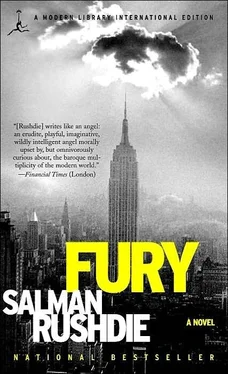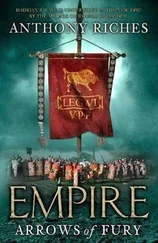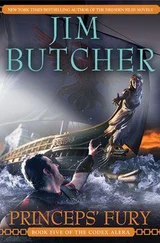Salman Rushdie - Fury
Здесь есть возможность читать онлайн «Salman Rushdie - Fury» весь текст электронной книги совершенно бесплатно (целиком полную версию без сокращений). В некоторых случаях можно слушать аудио, скачать через торрент в формате fb2 и присутствует краткое содержание. Город: New York, Год выпуска: 2002, ISBN: 2002, Издательство: Random House Publishing Group, Жанр: Современная проза, на английском языке. Описание произведения, (предисловие) а так же отзывы посетителей доступны на портале библиотеки ЛибКат.
- Название:Fury
- Автор:
- Издательство:Random House Publishing Group
- Жанр:
- Год:2002
- Город:New York
- ISBN:0679783504
- Рейтинг книги:5 / 5. Голосов: 1
-
Избранное:Добавить в избранное
- Отзывы:
-
Ваша оценка:
- 100
- 1
- 2
- 3
- 4
- 5
Fury: краткое содержание, описание и аннотация
Предлагаем к чтению аннотацию, описание, краткое содержание или предисловие (зависит от того, что написал сам автор книги «Fury»). Если вы не нашли необходимую информацию о книге — напишите в комментариях, мы постараемся отыскать её.
Fury — читать онлайн бесплатно полную книгу (весь текст) целиком
Ниже представлен текст книги, разбитый по страницам. Система сохранения места последней прочитанной страницы, позволяет с удобством читать онлайн бесплатно книгу «Fury», без необходимости каждый раз заново искать на чём Вы остановились. Поставьте закладку, и сможете в любой момент перейти на страницу, на которой закончили чтение.
Интервал:
Закладка:
Words for drink played a distressingly big part in her back-story. In the matter of grog, yaqona, kava, beer, as in little else, the Indo-Lilliputians and Elbees were as one; both communities suffered from alcoholism and the problems associated with it. Her own father was a big boozer, and she had been glad to escape him. There were very few scholarships to America available in Lilliput-Blefuscu, but she won one of them, and fell for New York at once, as did everybody who needed, and found here, a home away from home among other wanderers who needed exactly the same thing: a haven in which to spread their wings. Yet her roots pulled at her, and she suffered badly from what she called “the guilt of relief.” She had escaped her drunkard of a father, but her mother and sisters had not. And to her community’s cause, too, she remained passionately attached. “The parades are on Sunday,” she said, ordering a third cosmopolitan. “Will you come with me?” And Solanka—it was Thursday already—inevitably agreed.
“The Elbees say we are greedy and want everything and will chase them out of their own land. We say they are lazy and if it wasn’t for us they would sit around doing nothing and starve. They say that the only end of a soft-boiled egg to break is the little one. Whereas we—or at least those of us who eat eggs—are the Big Endians, from Big Endia.” She cackled again, tickled by her own joke. “Trouble is coming soon.” It was a question, as so many things were, of the land. Even though the Indo-Lilliputians on Blefuscu now did all the farming, were responsible for most of the country’s exports, and therefore earned most of the foreign exchange; even though they had prospered and cared for their own, building their own schools and hospitals, still the land on which all this stood was owned by the “indigenous” Elbees. “I hate that word, ‘indigenous,’ “ Neela cried. “I’m fourth-generation Indo-Lilly. So I’m indigenous too.” The Elbees feared a coup-a revolutionary land grab by the Indo-Lilly, to whom the Elbee constitution still denied the right to own real estate on either island; the Big Endians, for their part, feared the same thing in reverse. They were afraid that when their hundred-year leases expired in the course of the coming decade, the Elbees would simply take back the now valuable farmland for themselves, leaving the Indians, who had developed it, with nothing.
But there was a complication, which Neela, in spite of her ethnic loyalty and three quick cosmopolitans, was honest enough to admit. “This isn’t just a question of ethnic antagonism or even of who owns what,” she said. “The Elbee culture really is different, and I can see why they are afraid. They’re collectivists. The land isn’t held by individual landowners but by the Elbee chiefs in trust for the whole Elbee people. And then we Big Endia-wallahs come along with our good business practice, entrepreneurial acumen, free-market mercantilism, and profit mentality. And the world speaks our language now, not theirs. It is the age of numbers, isn’t it? So we are numbers and the Elbees are words. We are mathematics and they are poetry. We are winning and they are losing: and so of course they’re afraid of us, it’s like the struggle inside human nature itself, between what’s mechanical and utilitarian in us and the part that loves and dreams. We all fear that the cold, machinelike thing in human nature will destroy our magic and song. So the battle between the Indo-Lillys and the Elbees is also the battle of the human spirit and, damnit, with my heart I’m probably on the other side. But my people are my people and justice is justice and after you’ve worked your butts off for four generations and you’re still treated like second-class citizens, you’ve got a right to be angry. If it comes to it I’ll go back. I’ll fight alongside them if I have to, shoulder to shoulder. I’m not kidding, I really will.” He believed her. And was thinking: how is it that, in the company of this impassioned woman I barely know, I feel so completely at ease?
The scar was the legacy of a bad car accident on the interstate near Albany; she had almost lost her arm. Neela by her own admission drove “like a maharani.” It was up to other road users to keep out of her imperious, supra-legal way. In areas where she and her car became known—Blefuscu, or the environs of her smart New England college motorists, when they saw Neela Mahendra coming, would often abandon their vehicles and run. After a series of small dings and near misses, she experienced the very unfunny Big One. Her survival was a miracle (and a close thing); the preservation of her heartbreaking beauty was an even greater astonishment. “I’ll take the scar,” she said. “I’m lucky to have it. And it’s a reminder of something I shouldn’t forget.”
In New York, fortunately, it was unnecessary for her to drive. Her regal attitude “my mother always told me I was a queen, and I believed her”—meant she preferred to be driven anyway, although she was also a terrible backseat driver, full of yelps and gasps. Her rapid success in television production enabled her to afford a car service, whose drivers quickly grew used to her frequent cries of fear. She had no sense of direction, either, and so-remarkably for a New Yorker—never knew where anything was. Her favorite stores, her preferred restaurants and nightclubs, the location of the recording studios and cutting rooms she regularly used: they could have been anywhere. “Where the car stops is where they are,” she told Solanka over the fourth cocktail, all wide-eyed innocence. “It’s amazing. They’re always right there. Right outside the door.”
Pleasure is the sweetest drug. Neela Mahendra leaned into him in their black leather booth and said, “I’m having so much fun. I never realized how easy it would be around you, you looked like such a stuffed shirt at Jack’s place, watching that stupid game.” Her head tilted toward his shoulder. Her hair was down now, and from where he was sitting it veiled much of her face. She let the back of her right hand move slowly against the back of his left hand. “Sometimes, when I drink too much, she comes out to play, the other one, and then there’s nothing I can do. She takes charge and that’s that.” Solanka was lost. She took his hand in hers and kissed the fingertips, sealing their unspoken compact. “You have scars, too,” she said, “but you never talk about them. I tell you all my secrets and you don’t say one single word. I think, why does this man never talk about his child? Yes, of course Jack told me, you think I didn’t ask? Asmaan, Eleanor, that much I know. If I had a little boy, I’d talk about him all the time. You apparently don’t even carry his photograph. I think, this man left his wife of many years, the mother of his son, and even his friend doesn’t know why. I think, he looks like a good man, a kind man, not a brute, so there must be a good reason, maybe if I open up to him he’ll tell me, but, baba, you just keep mum. And then I think, here is this Indian man, Indian from India, not Indo-Lilly like me, a son of the mother country, but apparently that also is a forbidden topic. Born in Bombay, but on the place of his birth he is silent. What are his family circumstances? Brothers, sisters? Parents dead or alive? Nobody knows. Does he ever go back to visit? Seems like not. No interest. Why? The answer must be: more scars. Malik, I think you’ve been in more accidents than me, and maybe you were even more badly hurt somewhere along the line. But if you don’t talk, what can I do? I have nothing to say to you. I can only say, here I am, and if human beings can’t save you then nothing can. That’s all I’m saying. Talk, don’t talk, it’s up to you. I’m having a good time and anyway now the other one is here, so shut up, I don’t know why men always have to talk so much when it’s obvious that words are not the thing required. Not required right now at all.”
Читать дальшеИнтервал:
Закладка:
Похожие книги на «Fury»
Представляем Вашему вниманию похожие книги на «Fury» списком для выбора. Мы отобрали схожую по названию и смыслу литературу в надежде предоставить читателям больше вариантов отыскать новые, интересные, ещё непрочитанные произведения.
Обсуждение, отзывы о книге «Fury» и просто собственные мнения читателей. Оставьте ваши комментарии, напишите, что Вы думаете о произведении, его смысле или главных героях. Укажите что конкретно понравилось, а что нет, и почему Вы так считаете.











